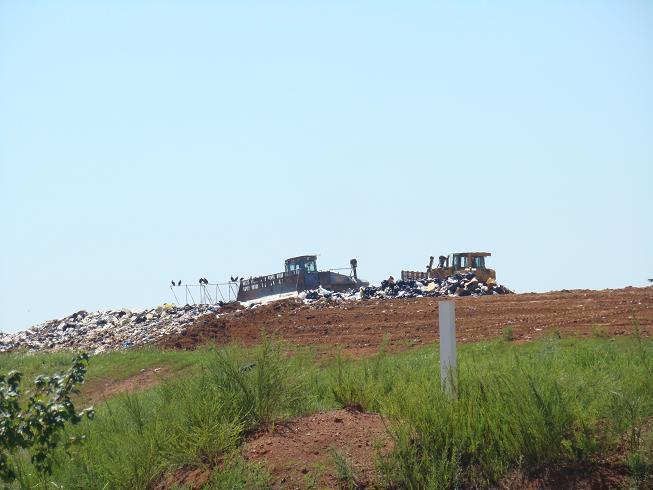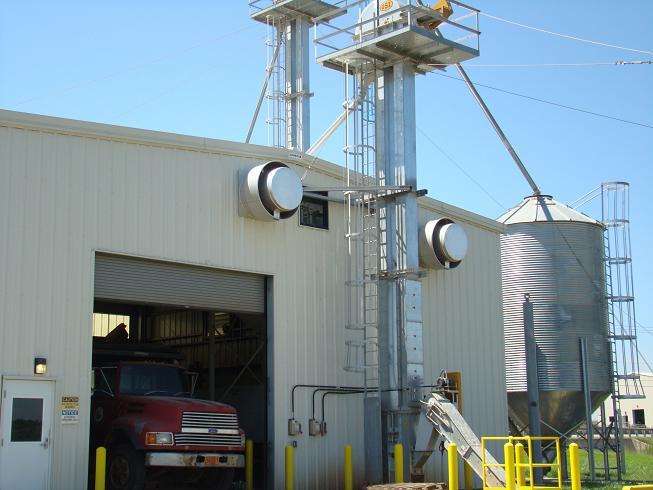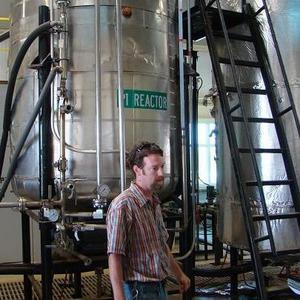EcoComplex tour highlights benefits of applied industrial ecology




Photo: Ron Kotrba, Biodiesel Magazine
August 18, 2014
BY Ron Kotrba
Nestled in the sparsely populated mountains of Western North Carolina is a cutting-edge research facility practicing applied industrial ecology. The Catawba County EcoComplex, co-located with the 800-acre Blackburn Landfill, underscores the importance of co-location and resource utilization to produce renewable energy with minimal carbon intensity. A tour spot for the 2014 Collective Biodiesel Conference co-hosted by Piedmont Biofuels and Central Carolina Community College in Pittsboro, N.C., the Catawba County EcoComplex, two-and-a-half hours west of the conference location, features 3 megawatts of electricity production from landfill gas, oilseed growth on 150 acres of buffer land, a 4-ton-per-day mechanical crush plant and a 130,000-gallon-per-year biodiesel production center—both of which are fed electricity and process heat and steam from the landfill. The EcoComplex also has a dynamometer to measure biodiesel emissions, taking the energy cycle full-circle.
Jeremy Ferrell, an associate professor at Appalachian State University, is operations manager at the Catawba County EcoComplex and is one of the brains behind its development. Leading the tour of the facility, Ferrell said the Blackburn Landfill was Jenbacher’s first test site for landfill gas to energy in 1999. The site, tied to the power grid, pulls in $300,000 to $400,000 a year in electricity sales. Ferrell said the project was born from waste reduction laws passed by the state legislature. Today, the landfill has 2.7 million tons in place and has a useful life of 70 years. Catawba County built the EcoComplex without tax dollars. Instead, the county borrowed money from the landfill’s post-closure fund accumulated from a small fraction of the tipping fees.
The Blackburn Landfill uses 1,500 to 1,700 gallons of diesel fuel a week in its operations, and the biodiesel produced on-site is blended at 20 percent to fuel the landfill and county government vehicles.
Advertisement
Advertisement
Ferrell said the triple helix model, where government, universities and private businesses coalesce to share costs and resources, is an optimal framework within which to develop projects such as the EcoComplex. The site is adjacent to two private firms, a pallet company and a lumber mill, to facilitate future growth in partnership with Appalachian State University and Catawba County. Gasification and multi-feed anaerobic digester projects at the EcoComplex are in the planning phases, and wood waste from the adjacent businesses is poised to provide feedstock for the future projects.
When industrial ecology practices are applied to methyl ester production, soy biodiesel can have a lower carbon intensity than that produced from waste vegetable oil in a traditional manner, Ferrell said.
Advertisement
Advertisement
Despite the environmental benefits realized from the EcoComplex, Ferrell said the small scale of the crush and biodiesel operations makes profitability a challenge. “The economics were marginal when the RIN was high and the dollar [tax credit] was in,” he said during the tour. “Now we’re losing money to crush seed.” He added that at this scale, the EcoComplex would need $1.20 per gallon in subsidies just to break even.
The financial challenges of small-scale biodiesel economics, along with the social and environmental benefits of community-scale production, were just a few of the many topics discussed at this year’s Collective Biodiesel Conference. The tour of the Catawba County EcoComplex preceded two days of dialogue, presentations and activities.
Biodiesel-powered transportation from Pittsboro to the Catawba County EcoComplex and back was provided by Durham-based Greenway Transit.
Related Stories
Avfuel Corp., the leading independent supplier of aviation fuel and services, is expanding its sustainable aviation fuel (SAF) footprint with the addition of a new, strategic supply point in Denver, Colorado—the first of its kind in the region.
ATOBA Energy and Air Moana are partnering to implement scalable solutions for the supply of SAF. The collaboration aims to ensure long-term SAF availability while supporting local initiatives to develop sustainable fuel production in Tahiti.
Kintetsu World Express Inc. has signed an additional agreement with Hong Kong, China-based Cathay Pacific Airways for the use of sustainable aviation fuel (SAF). The agreement expands a three-year partnership between the two companies.
Broco Energy on July 17 announced a new partnership with the Massachusetts Port Authority (Massport) to deliver and transition Massport's fuel tanks to renewable diesel across its various facilities.
Shell Aviation, Accenture, and Amex GBT on July 10 announced Avelia is in the process of evolving to an industry solution with independent data hosting and a multi-supplier model helping users access the GHG benefits of SAF.
Upcoming Events










